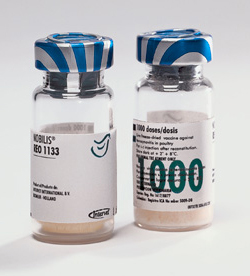Nobilis® REO 1133

The safe REO live vaccine. A mild vaccine against Reovirus infections in chickens (tenosynovitis).
Description
Nobilis Reo 1133 is a mild vaccine against Reovirus infections in chickens.
Composition
Active components per dose:
Live Reovirus strain 1133: >= 3.1 log10 TCID50
Formulation
A freeze-dried pellet.
Indications
For the immunization of chickens against Reovirus infections.
Vaccination
Protection against Reovirus involves the maternal transfer of antibody through the yolk to the progeny, so an integrated programme using both inactivated and modified live virus vaccines is recommended. In areas of high exposure, chicks can become susceptible during the first weeks of life, and early vaccination becomes mandatory. In these areas, vaccination should begin at 7 days of age. Re-vaccination is recommended at 5 to 7 weeks of age and again at 9 to 11 weeks. In areas where there is less exposure, vaccination should be carried out at 5 to 7 weeks of age and again at 9 to 11 weeks. To complete this programme for breeding birds, the administration of an inactivated Reovirus vaccine is recommended between 16 to 18 weeks of age.
Dosage
0.2 ml per bird.
Method of administration
Subcutaneously in the back of the neck or intramuscularly in the breast muscle or thigh.
Withholding period
None
Presentation
Boxes of vials each containing 1000 doses.
Storage
Store at a temperature of 2-8°C in the dark.
Contra-indications
When used according to instructions: None.
Further information
– Use entire contents when first opened.
– Do not vaccinate within 12 weeks of the onset of lay or during lay.
– Do not use this vaccine in combination with Marek’s Disease vaccine or live Gumboro vaccine!
– Dispose of empty or part-used vials in accordance with local regulations.
Precautions
– Vaccinate healthy birds only. Although disease may not be evident, coccidosis, Mycoplasma infection, Marek’s disease and other disease conditions may cause complications or reduce the level of immunity developed.
– Efforts should be made to reduce stress during vaccination and the post-vaccination period.
– Once reconstituted, the vaccine is very vulnerable and may lose its activity depending on environmental condition.
